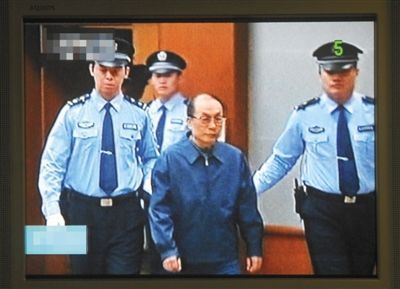


By Chen Jieren (陳杰人)
July 9, 2013
Economic Observer Online
Translated by Laura Lin
Original article: [Chinese]
Last Monday, Liu Zhijun ((劉志軍), China's former Railway Minister, was sentenced to death with a reprieve of two years. Liu was also stripped of his political rights for life and also had all his personal assets confiscated.
Liu was found guilty of taking 64.6 million yuan in bribes and of abuse of power, which caused a particularly heavy loss of public property and damaged the interests of individuals, as well as, the nation. Since Liu Zhijun has clearly stated that he will not appeal, this sentence will be this case's final outcome.
To be honest, my heart is very torn by seeing the onetime "railroad hero" (鐵路英雄) reduced to this. On the one hand, I marvel at his fall and even feel a pang of regret for him. On the other, given the clear proof of his crime, I am also happy to see him severely punished by the law. In the end, though, I am convinced most of all that the court's discretionary judgment that leaves Liu the possibility of avoiding execution should be encouraged.
Many Chinese believe that, unless Liu is executed, the court will be unable to appease the public's resentment, that only a death sentence can set an example of how a corrupt official is properly punished. I understand the reasons behind the public's wish to see Liu executed. Their wish is based on a pursuit of judicial fairness and justice, a hatred of crooked officials, and the need to eliminate corruption.
Still, I see four clear reasons not to put Liu to death.
First, from a factual and legal point of view, the court held that Liu had accepted 64.6 million yuan in bribes. However, there exists a huge dispute about 49 million yuan worth of "public relation fees." It was a sum that Liu got some businessmen to pay so that He Hongda (何洪達(dá)), his Vice-Minister who was under arrest, would be punished less severely. The court found that Liu also intended to use the money to help avoid any punishment himself.
Still, from the most rigorous principle of proof, this part of the money should not be considered as a bribe, which would reduce the total amount to only RMB 15 million. With such a sum and taking into account the sentences handed down in corruption cases in the past three years, Liu doesn't deserve to be executed.
Second, the reason why so many favor putting Liu to death is his senior position. However, we should never put all the blame on Liu because of our years of hatred of the chaos at the Railway Ministry or even the difficulty of buying tickets during the rush over Chinese New Year. Alas, viewing Chinese reaction on the Internet, it's precisely because they hate the Ministry so much that they wish to see the execution of Liu. Such irrational venting of anger is clearly contrary to the principle of justice.
Third, Liu deserves credit for the immense contribution, during his long years of service, to China's railway development. That China has an ever expanding high-speed rail network today, which brings great convenience to people and applies competitive pressure to the civil aviation industry is due in no small measure to Liu. He is a sort of "tragic hero" in a society where corruption is ubiquitous.
Fourth, from the concept of criminal law, I resolutely advocate abolishing the death penalty. To achieve this goal the death sentence for non-violent crimes such as economic crimes should be abolished first. However big the bribe Liu took, he is not a dangerous man.
Some might question why it is that every time a corrupt official has fallen, there's always someone coming out to call for the abolition of capital punishment?
The logic arouses suspicion. In fact, such calls are not to justify a particular corrupt official's acts. They are speaking of all non-violence crime: bribery, theft, fraud or smuggling.
Looking back over China's recent history, which can be qualified as the "history of revolutionary struggle" (革命斗爭史), we see too much belligerence and bloodshed. Because of this, there is an absence of trust, care, and tolerance among people. This helps explain why so many Chinese people still believe in the role of the death penalty and advocate "killing in order to appease the public" (殺人平民憤).
They do not realize that the more we behave this way, the more social divisions deepen, and the formation of a civil society based on mutual trust, support, and tolerance is less likely. If we forgive a corrupt official today, it looks like we are forgiving a criminal. But in fact, it is a way to calm our own deep-seated instincts of violence, and bid farewell to the part of Chinese history steeped in conflict, struggles, and blood.
Four years ago, I wrote an article titled "Five Reasons Why Liu Zhijun Must Resign" (劉志軍必須引咎辭職的五個理由). In that article, I enumerated his wrongdoings and abuse of power, but this article was banned from most Chinese Internet sites. We know from this that if China were really a place with freedom of speech, where citizens' rational criticisms could really influence an official's future and were this a society with true equality before the law and real democracy, Liu wouldn't have fallen so far.
In this sense, what pushes Liu, a man of high capabilities and outstanding administrative performance, into jail is exactly our institutions. When one only thinks about executing Liu in order to appease the public, we fall into the trap set by a certain group of people. This is using a kind of passive approach to problems that is "unable to see the forest for the trees" (只見樹木不見森林). If such a national mentality continues to exist, the ultimate victim will always be the public.
News in English via World Crunch (link)